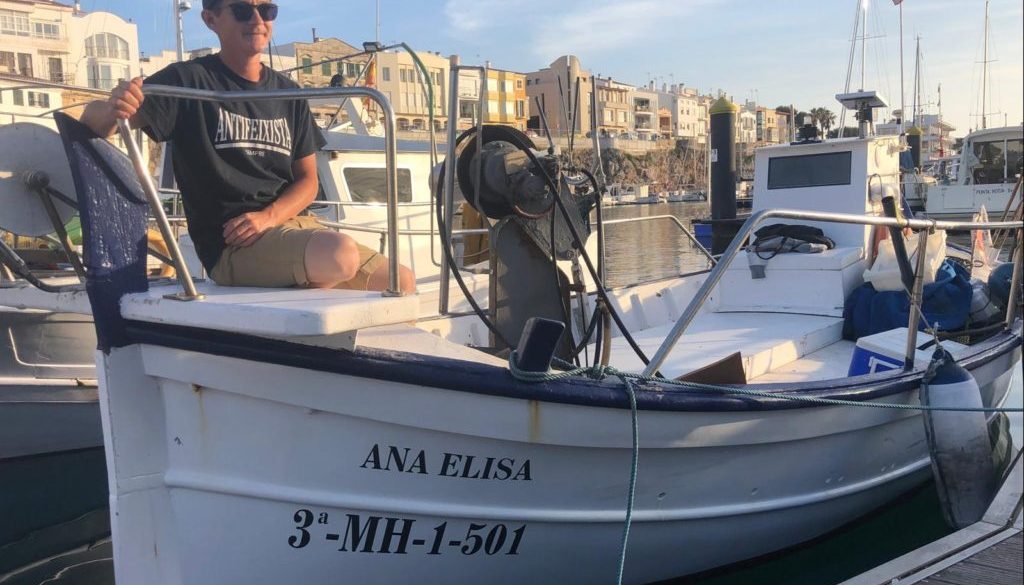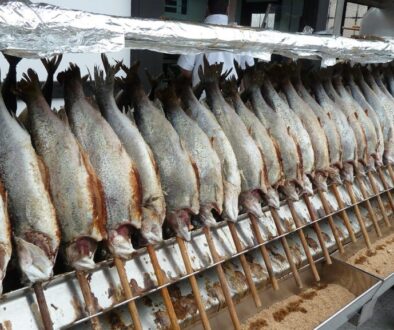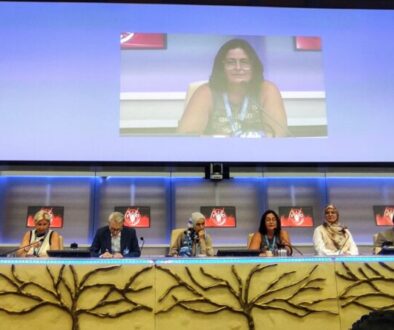En el año 2021, Bosco, nieto y hermano de pescadores artesanales de Ciutadella decidió comprar su primera barca de pesca y así convertirse en el pescador más joven de ese puerto de Menorca. Tiene 29 años, y después de siete años siendo marinero en la barca de su hermano, se animó a hacer el salto que muchos marineros sueñan poder realizar algún día; convertirse en su propio jefe al ser patrón de una embarcación de pesca.
“No es lo mismo que te digan cala allí, que tengas que decidir tú donde calar las redes”, comenta Bosco. Sin embargo, a pesar de la experiencia adquirida pescando con su hermano y la suerte de heredar el conocimiento ecológico tradicional de su familia pescadora, ser el propio patrón de una barca de pesca, no es tarea fácil, por muy pequeña y artesanal que sea la embarcación.
La falta de renovación generacional en la pesca es un gran problema que está poniendo en riesgo el futuro del sector en muchos puertos de esta región. Muy pocos jóvenes deciden trabajar en el mar; es una profesión muy poco atractiva para los jóvenes, aunque como confiesa el hermano de Bosco “si te gusta, es el mejor trabajo del mundo. No tienes jefes, haces los horarios que quieres y te puedes ganar bien la vida”me comenta el hermano de Bosco. Los que sí se animan como Bosco a dar el salto, se encuentran con muchas trabas hasta poder estar listo para salir a calar por primera vez.
El primer paso de Bosco fue elegir y comprar un barco, en este caso uno típico del Mediterráneo llaüt. Su presupuesto era limitado; no contaba con ninguna ayuda externa, y sólo tenía sus propios ahorros y los de su socio. Hoy en día, varios pescadores se jubilan cada año en las Islas Baleares y la costa catalana, por lo que encontrar un barco de pesca con licencia es fácil. Sin embargo, en el caso de Bosco, como la mayoría de los jóvenes pescadores, su limitado presupuesto le obligó a comprar un llaüt bastante viejo. En septiembre de 2021, compró el barco a un pescador jubilado en el puerto de Ciutadella.
Comprar un barco viejo significa más trabajo de mantenimiento. En este caso había que arreglar el motor porque no arrancaba, y "No es tan fácil encontrar un mecánico de confianza en la isla, muchos ya trabajan con varios pescadores pero no aceptan necesariamente más trabajo"comparte Bosco. Por otra parte, los barcos de pesca cuentan hoy en día con cada vez más tecnología, incluyendo al menos una sonda de profundidad y un GPS. Estos dispositivos permiten una pesca más precisa y fructífera, aunque ello suponga una inversión.
En septiembre de 2021, Bosco me dijo, por ejemplo, que le gustaría poder instalar un programa informático que le permita ver el fondo marino en 3D, un programa que llevan muchos pescadores, pero no encuentra a nadie en la isla que quiera venderle el programa, o no sabe dónde comprarlo. Montar un barco implica ser electricista, mecánico, pintor, saber reparar los aparejos de pesca, así como ser capaz de ocuparse de las tareas administrativas, que son complejas en el sector pesquero. Afortunadamente, para ellas cuenta con el apoyo del secretario de la cofradía de pescadores (Cofradia) y de su socio, contable y gestor. Así, los primeros meses tras la compra de su barco los dedicó a poner a punto la embarcación y los aparejos de pesca: "Cada día hay una nueva sorpresa, pero poco a poco lo voy consiguiendo"dice.
Sin embargo, cuando le pregunté qué era lo más difícil de empezar como pescador autónomo, me sorprendió su respuesta: "No sé cuánto tengo que cobrar (por mi pescado) para cubrir mis gastos". Ser pescador significa ser empresario, cada barco es una pequeña empresa, tiene sus costes fijos como las tasas de amarre o los préstamos, pero también muchos costes variables como el combustible, el mantenimiento del barco, las tasas portuarias sobre las capturas y otros impuestos diversos. "Como miembro de la tripulación no tenía acceso a las cuentas del barco/empresa, no sé exactamente cuánto cobrábamos ya que me pagaban a medias, según lo que pescábamos".
El secreto en la pesca es un concepto común y normalizado entre los pescadores. Aunque en este caso, el patrón con el que trabajó los últimos 7 años era su hermano, seguía existiendo cierto secretismo sobre las cuentas de la empresa. Ser un pescador de éxito hoy en día implica saber no sólo pescar, sino también vender y gestionar un negocio. A este respecto, cabe señalar que los cursos de formación profesional náutico-pesquera no ofrecen ninguna formación sobre gestión de empresas pesqueras, contabilidad, etc. En el pasado, las mujeres desempeñaban un papel importante en la gestión de las cuentas, ya que se encargaban de vender el pescado por los hombres de la familia. Hoy en día ya no es así, y aunque el modelo tradicional de empresa pesquera familiar está desapareciendo, Bosco cuenta con el apoyo de su socio, que trabaja como contable y gestor administrativo, "Tengo la suerte de contar con su apoyo, me animó a comprar mi propio barco"dice.
En Menorca no existe un sistema de mercado o subasta de pescado, y la venta se realiza directamente, lo que significa que cada pescador tiene que establecer sus propios canales de venta y encontrar la forma de vender las capturas diarias. "Todavía no sé a quién voy a vender el pescado"dice Bosco. En un lugar tan pequeño como Menorca, los canales de venta ya están establecidos entre pescadores y mayoristas y no es fácil hacerse un hueco, sobre todo en invierno, cuando la demanda es baja. La pesca es un sector en el que conviven la cooperación y la competitividad. Si tienes un problema grave en el mar, sueles contar con el apoyo de los demás pescadores, pero en tierra esta cooperación no siempre existe.
En abril de 2022, al comienzo de la temporada de la langosta en Menorca, y después de pasar el invierno preparando el barco y los aparejos de pesca, Bosco empezó a trabajar oficialmente. Debido al mal tiempo, sólo pudo salir 9 días en ese primer mes del año. A finales de abril, me contó que el segundo día que quiso salir, le falló el motor y tuvo que ir a levantar las redes con el barco de su hermano. "Fue un poco triste pescar mis primeras langostas con el barco de mi hermano y no con el mío, ... pero mi barco ya está arreglado".
Me sorprende ver que no va solo, su hermana le ha acompañado hoy de marinera, para ella también es una primera vez ya que nunca había trabajado de pescadora, ha venido a probarlo me dice. No es la única marinera del puerto ya que otras dos chicas están embarcadas en la barca de su padre.
Ese mismo día de finales de abril, me cruzo con Bosco en frente de la cofradía de Ciutadella donde espera para pesar sus capturas después de llegar a puerto mientras va comentando la jornada con Andreu otro pescador con quien tiene buena relación. Le veo animado aunque no está del todo contento de sus capturas, tiene 4 o 5 langostas “solo” pero también algo de pescado. ¡Con esto ya cubres gastos al menos! le dice Andreu para animarle. La temporada de langosta sigue hasta finales de agosto.
Annya Crane
Los datos recogidos para este artículo son el fruto de varias conversaciones con Bosco durante el año 2021 y 2022.



